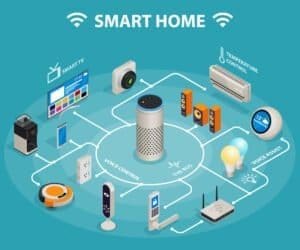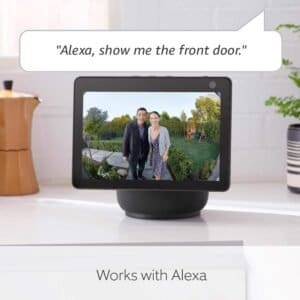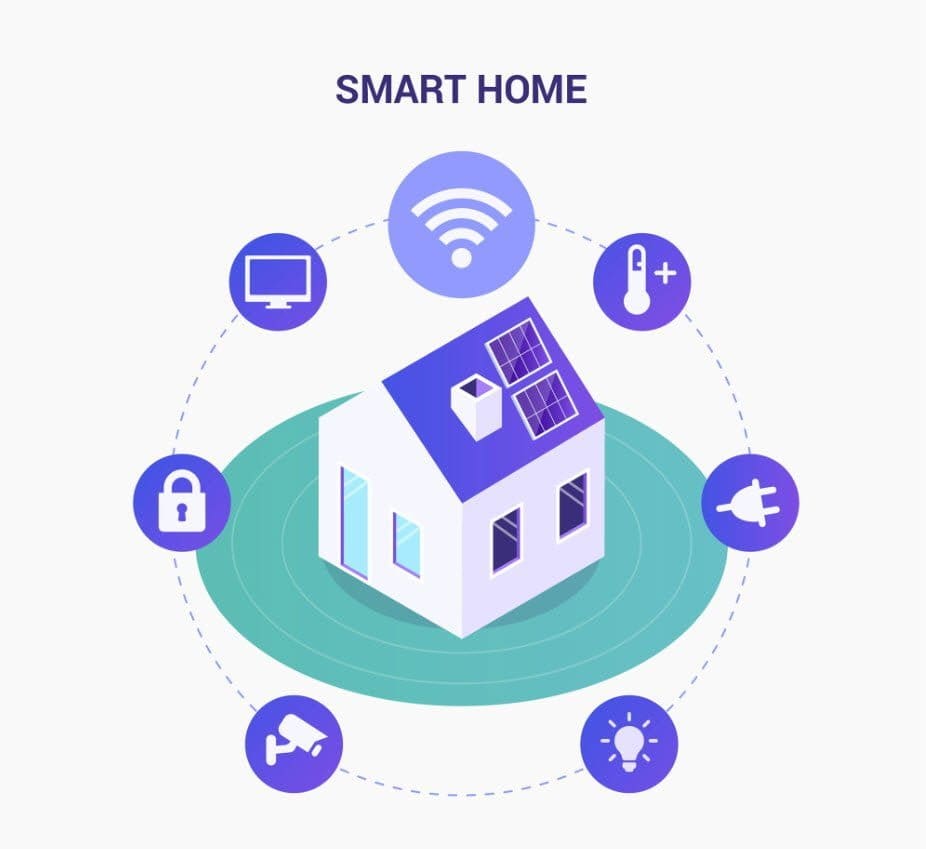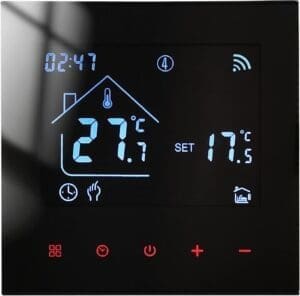Imagine a world where your home feels like a personal assistant, taking care of your every need. From adjusting the temperature to monitoring your appliances, smart homes have the potential to revolutionize the way we live. But can they also lend a helping hand when it comes to tedious home maintenance tasks? In this article, we explore the exciting possibilities that smart homes offer in streamlining upkeep and enhancing our daily lives.
Benefits of a Smart Home
Convenience and Efficiency
One of the major advantages of having a smart home is the convenience it offers. With smart devices integrated into your home, you can control various aspects of your home with just a few taps on your smartphone or voice commands. Imagine being able to adjust the thermostat, turn on the lights, or even lock the doors without having to leave your seat. Smart homes bring convenience right to your fingertips.
Not only does a smart home make your life more convenient, but it also enhances efficiency. For example, with a smart thermostat, you can program your heating and cooling settings to automatically adjust based on your schedule. This means your home will always be at the ideal temperature when you arrive, without wasting energy when no one is home. Similarly, smart lighting systems allow you to set schedules or use motion sensors to ensure lights are only on when needed. By optimizing energy consumption, smart homes contribute to a greener and more sustainable environment.

Cost Savings
Smart homes also offer the benefit of cost savings. Although the initial investment may seem high, the long-term savings outweigh the upfront costs. By optimizing energy usage through smart devices, you can reduce your utility bills significantly. With smart thermostats, for example, you can monitor and control your heating and cooling settings, leading to more efficient energy usage. By avoiding unnecessary energy consumption, you’ll see savings in your monthly bills.
In addition to energy savings, smart homes can help prevent costly incidents. For instance, smart water leak detectors can alert you at the first sign of a leak, preventing extensive water damage and expensive repairs. Smart security cameras and systems can also deter potential burglars and protect your property, potentially saving you from the financial loss and emotional distress of a break-in.
Enhanced Security
Home security is a top concern for many homeowners, and smart homes provide an enhanced level of security. Smart security cameras, for instance, allow you to monitor your property from anywhere in the world. Whether you’re at work or on vacation, you can access the live feed of your cameras and receive instant alerts if any unusual activity is detected. This gives you peace of mind knowing that you can keep an eye on your home at all times.
Smart home security systems also offer features such as remote locking systems and video doorbells. With a remote locking system, you can secure your home and lock or unlock doors from anywhere. Video doorbells, on the other hand, allow you to see who’s at your doorstep and communicate with them, even if you’re not physically present. These features help protect your home and provide an extra layer of security, ensuring you never miss a visitor or potential threat.
Smart Devices for Home Maintenance
Smart Thermostats
Smart thermostats are a fantastic addition to any smart home, providing not only convenience but also energy efficiency. These devices allow you to control your home’s temperature settings remotely, ensuring optimal comfort and reducing energy waste. With a smart thermostat, you can program heating and cooling schedules based on your daily routine, so you can enjoy a comfortable temperature when you come home without having to leave your heating or cooling systems running all day. Some smart thermostats even learn your habits and adjust settings automatically, further enhancing energy efficiency.
Smart Lighting Systems
Gone are the days of manually switching lights on and off or using traditional timers to control lighting. Smart lighting systems offer an intuitive and energy-efficient solution to lighting your home. With smart bulbs and switches, you can remotely control your lights and customize brightness levels to suit your preferences. Furthermore, smart lighting systems can be programmed to turn on and off at specific times or even respond to motion sensors. This not only saves energy but also enhances security by giving the appearance that someone is home, even when you’re away.
Smart Security Cameras
Smart security cameras are a crucial component of a smart home, providing an extra level of protection for your property. These cameras come equipped with advanced features like high-definition resolution, night vision, and motion detection. With live streaming capabilities, you can monitor your home anytime and anywhere through a smartphone app or computer. Some smart security cameras even offer two-way audio, allowing you to communicate with whoever is in your home or at your doorstep. These cameras ensure that you’re always aware of what’s happening on your property, giving you peace of mind.
Smart Water Leak Detectors
Water leaks can cause significant damage to your home if left undetected. Smart water leak detectors act as an early warning system, alerting you to potential leaks before they become big problems. These detectors use sensors to monitor the water flow in your home’s plumbing system, instantly notifying you of any irregularities or leaks. By receiving timely alerts, you can address the issue promptly and prevent water damage, saving you from costly repairs and potential mold growth.

Automated Cleaning and Maintenance
Robotic Vacuum Cleaners
Cleaning your home can be a time-consuming and tedious task, but with robotic vacuum cleaners, the burden is significantly reduced. These smart devices navigate your home autonomously, sweeping and vacuuming your floors with minimal intervention required from you. You can schedule cleaning times through a smartphone app, ensuring your floors stay clean even when you’re not at home. Robotic vacuum cleaners use sensors to avoid obstacles and can even map your home to optimize their cleaning patterns. With this smart solution, you can spend less time on maintaining cleanliness and more time on activities you enjoy.
Automated Lawn Mowers
Maintaining a well-groomed lawn can be a tiresome chore, especially during the peak growing seasons. However, with automated lawn mowers, you can say goodbye to the hassle of traditional mowing. These smart devices can mow your lawn systematically, covering the entire area on their own. You can set schedules, adjust cutting heights, and monitor progress through a smartphone app. By automating this task, you free up time and energy to focus on other aspects of home maintenance.
Smart Sprinkler Systems
Maintaining a lush and healthy garden requires regular watering, but doing so manually can be inefficient and time-consuming. Smart sprinkler systems offer a solution by automating the watering process. These systems can be programmed to adjust watering schedules based on weather conditions, ensuring your plants receive the right amount of water at the right time. Some smart sprinkler systems even have moisture sensors that measure soil moisture levels, preventing overwatering and conserving water. With the convenience of a smart sprinkler system, you can keep your garden thriving without the manual effort.
Monitoring and Alert Systems
Smart Smoke and Carbon Monoxide Detectors
Smoke and carbon monoxide detectors are critical for home safety, and smart versions of these devices offer added benefits. Smart smoke and carbon monoxide detectors not only sound an alarm when they detect danger but also send alerts to your smartphone, even when you’re away from home. This means you can receive instant notifications if there’s a potential fire or gas leak, enabling you to take immediate action. Some smart detectors even provide detailed information about the type and location of the detected hazard. With these smart devices, you can have peace of mind knowing that your home and loved ones are protected.
Smart HVAC Systems
Heating, ventilation, and air conditioning (HVAC) systems play a vital role in the comfort of your home, and smart HVAC systems take this to the next level. These systems allow you to control and monitor your HVAC settings remotely, ensuring the perfect temperature when you come home or adjusting settings when you’re away. Smart HVAC systems can learn your preferences and habits, automatically adjusting settings to optimize energy usage and save you money. Some intelligent systems can even integrate with weather forecasts to proactively adapt to changing conditions. With a smart HVAC system, you have complete control over your home’s climate and energy efficiency.
Smart Home Energy Monitors
If you’re looking to keep a closer eye on your home’s energy consumption, smart home energy monitors are the perfect solution. These devices provide real-time data on your energy usage, allowing you to monitor and track how much electricity your home is consuming. With this information, you can identify energy-hungry appliances or devices and make adjustments to reduce your overall consumption. Smart home energy monitors can also analyze historical data to provide insights and recommendations for optimal energy usage. By being aware of your energy usage patterns, you can make informed decisions to reduce your environmental footprint and save on energy bills.
Remote Control and Access
Remote Locking Systems
With a smart remote locking system, you no longer have to worry about forgetting to lock your doors or carrying a bunch of keys. These systems allow you to lock or unlock your doors remotely through a smartphone app or using voice commands. Whether you’re already in bed or at the office, you can easily secure your home with a few taps on your phone. Some smart locking systems even offer additional features like temporary access codes for guests or keyless entry options. With remote locking systems, you have complete control over access to your home, providing both convenience and peace of mind.
Video Doorbells
Video doorbells have revolutionized the way we interact with visitors and monitor our doorsteps. With a smart video doorbell, you can see and speak to whoever is at your door, even if you’re not at home. These devices transmit live video feeds to your smartphone, allowing you to visually verify the identity of visitors before remotely unlocking the door or instructing them where to leave a package. Video doorbells also record footage, providing a helpful record of any suspicious activity that may occur in front of your home. With this smart technology, you can enhance security and convenience for your home and family.

Smart Garage Door Openers
No more driving back home just to ensure you closed your garage door – smart garage door openers provide a convenient solution. These devices allow you to open, close, and monitor your garage door remotely from a smartphone app. Whether you forgot to close the door or need to grant access to someone, you can do it all with a few taps on your phone. Some smart garage door openers even provide real-time notifications, letting you know if the door is left open or if someone is attempting to gain unauthorized access. With a smart garage door opener, you can have complete control over your garage, enhancing security and convenience.
Scheduling and Reminders
Smart Appliances
Smart appliances have transformed the way we interact with our household tasks. These devices offer features like programmable timers, remote control, and even integration with voice assistants. For example, a smart oven can be preheated remotely, a smart dishwasher can be set to run during off-peak energy hours, and a smart washing machine can notify you when a cycle is complete. By integrating these appliances into your smart home system, you can streamline your daily routines and make household chores more efficient. With smart appliances, you no longer have to worry about forgetting to turn on or off your appliances or keep track of their progress – they’ll be more adaptable to your needs.
Smart Reminder Systems
We all need reminders to help us stay organized and on top of our tasks, and smart reminder systems are here to assist. These systems can be integrated into your smart home and help you remember important events, appointments, or tasks. Whether it’s reminding you to take out the trash, pay bills, or water your plants, a smart reminder system can send notifications to your smartphone or display reminders on smart displays or speakers. By providing gentle nudges and notifications, these systems ensure that you never forget an important task again. With smart reminders, you can stay organized and manage your time more effectively.
Predictive Maintenance
Smart HVAC Systems
Smart HVAC systems not only provide comfort and energy efficiency but also offer predictive maintenance capabilities. These systems can analyze data and detect potential issues before they turn into major problems. For example, if a component is showing signs of wear or if the system’s performance drops, smart HVAC systems can send you a notification, allowing you to address the issue promptly. By taking preventive measures, you can save on expensive repairs and prolong the lifespan of your HVAC system. With the ability to predict maintenance needs, smart HVAC systems ensure that your home remains comfortable and your system operates at its best.
Smart Water Usage Monitoring
Water conservation is becoming increasingly important, and smart water usage monitoring devices can help you achieve that. These devices can track your water consumption and provide real-time data on usage patterns in your home. By identifying excessive or wasteful water usage, you can make informed decisions to reduce consumption and conserve water. Some smart devices can even detect leaks, notifying you of potential water waste or damage. With smart water usage monitoring, you can contribute to conservation efforts while also saving on water bills.
Smart Appliance Diagnostics
Smart appliances are equipped with advanced diagnostics capabilities, allowing them to monitor their own performance and detect potential issues. With access to the device’s internal sensors and data, smart appliances can pinpoint problems and provide notifications or recommendations for maintenance or repairs. For example, a smart refrigerator can analyze temperature fluctuations and alert you if there’s an issue with its cooling system. By proactively addressing these issues, you can avoid breakdowns, costly repairs, and food spoilage. With smart appliance diagnostics, you can ensure that your appliances function optimally and prevent inconvenient disruptions.
Integration with Home Maintenance Services
Connecting with Service Providers
Smart home technology is becoming increasingly integrated with home maintenance services. Many service providers, such as HVAC technicians, plumbers, and electricians, are now equipped with the necessary tools and knowledge to work with smart home systems. This means that if you encounter a maintenance issue in your home, you can easily connect with a service provider who can remotely diagnose the problem or access your smart devices to resolve the issue. This integration saves time and eliminates the need for multiple service visits, providing a more efficient and seamless home maintenance experience.
Home Maintenance Task Tracking
Managing home maintenance tasks can sometimes be overwhelming, but thanks to smart home technology, you can now keep track of these tasks more efficiently. Smart home maintenance apps and platforms allow you to create task lists, set reminders, and track the completion of various maintenance tasks. Whether it’s changing air filters, checking smoke detector batteries, or scheduling routine maintenance, these platforms can help you stay organized and ensure that your home is well-maintained. By streamlining the management of these tasks, you can prevent them from falling through the cracks and keep your home in top condition.
Challenges and Considerations
Privacy and Data Security
As with any technology that collects and stores data, privacy and data security are important considerations when it comes to smart home systems. These systems may collect personal information, such as usage patterns, schedules, or even video footage. It’s crucial to choose reputable smart home devices and platforms that prioritize data encryption, secure cloud storage, and robust privacy policies. Additionally, it’s important to regularly update the firmware and software of your smart devices to ensure they have the latest security patches. By being mindful of privacy and data security practices, you can enjoy the benefits of a smart home with peace of mind.
Compatibility and Interoperability
The compatibility and interoperability of smart home devices are important factors to consider. When building a smart home system, it’s essential to choose devices that can communicate and work together seamlessly. Some devices may be incompatible with certain platforms, making it difficult to integrate and control them within a single ecosystem. Therefore, it’s important to research and choose devices that are compatible with your existing smart home infrastructure or opt for devices that have broad compatibility with popular platforms. Ensuring compatibility and interoperability will make it easier to manage and control your smart home system.
Initial Investment and Setup
While the benefits of a smart home are unquestionable, it’s important to consider the initial investment and setup process. Smart home devices can be more expensive than their traditional counterparts, and setting up a comprehensive smart home system may require professional installation or technical expertise. Additionally, configuring and integrating multiple devices can be time-consuming and complex, especially if you’re not familiar with smart home technology. However, with advancements in technology and more user-friendly devices, the initial setup and installation process is becoming more simplified. Moreover, the long-term benefits, cost savings, and convenience of a smart home often outweigh the upfront investment and setup challenges.
Conclusion
A smart home brings numerous benefits and enhancements to the realm of home maintenance. From convenience and efficiency to cost savings and enhanced security, smart devices transform the way we interact with our homes. With features like remote control and access, scheduling and reminders, predictive maintenance, and integration with home maintenance services, smart homes simplify and improve the management of various home maintenance tasks. While challenges like privacy and data security, compatibility, and initial investment exist, the advantages of living in a smart home outweigh these considerations. As the technology continues to evolve, the future of smart homes looks promising, and the possibilities for home maintenance are infinite.

